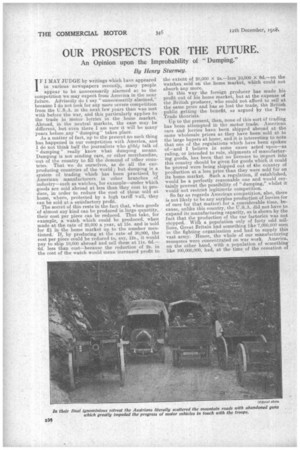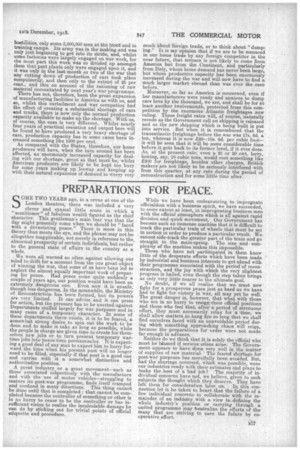OUR PROSPECTS FOR THE FUTURE.
Page 16

Page 17

If you've noticed an error in this article please click here to report it so we can fix it.
An Opinion upon the Improbability of "Dumping."
By Henry Stunney.
IF I MAY JUDGE by writings which have appeared in various newspapers recently, many people appear to be unnecessarily alarmed as to the competition we may expect from America in the near future. Advisedly do 1-say "unnecessarily alarmed," because I do not look for any more severe competition from the U.S.A. in the next few years than was. met with before the war, and this particularly applies to the trade in motor lorries in the home market. Abroad, in the neutral markets, the ease may be different, but even there I am sure it will be many years before any " dumping" takes place.
As a matter of fact, up to the present no such thing has happened in our competition with America, and I do not think half the journalists who glibly talk of " dumping " really • know what dumping means. Dumping is not sending cars, or other merchandise, out of the country to fill the demand of other countries. That we do ourselves, as do all the carproducing countries of the world, but dumping is a system of trading which has been practised, by American manufacturers in other branches of industry—such as watches, for example—under which goods are sold abroad at less than they cost to produce, in order to reduce the cost of those sold at home, where, protected by a high tariff wall, 'they can be sold at a satisfactory profit.
The secret of this rests in the fact that, when goods of almost any kind can be produced in large quantity, their cost per piece can be reduced. Thus take, for example, a watch which could be produced, when made at the rate of 20,000 a year, at 15s. and is -sold for 21 in the home market up to the number mentioned. If, by producing at the rate of 30,000, the cost per piece could be reduced to, say, 12s., it would pay to ship 10,000 abroad and sell them at us. 6d.6d. less than cost—because the reduction of 2s. in the cost of the watch would mean increased profit to
the extent of 20,000 X 2s.—less 10,000 x 6d.—on the watches sold on the home market, which could not absorb any more
In this way the foreign _producer has made his profit out of his home market, but at the expense of the British producer, who could not afford to sell at the same price and has so lost the trade, the British public getting the benefit, as argued lpy the Free Trade theorists.
Up to the present, then, none of this sort of trading has been attempted in the motor trade. American cars and lorries have been shipped abroad at the same wholesale prices as they have beensold atto the large buyers at home, and it is interesting to note that one of the regulations which have been spoken of—and I believe in some cases acted upon—as ruling, or intended to rule, shipments of manufacturing goods, has been that no licenses to import into this country should be given for goods which it could be proved were being shipped out of the country of production at a less price than they were sold for on its home market. Such a regulation, if established, would be a perfectly reasonable one and would certainly prevent the possibility of "dumping," whilst it would not restrict legitimate competition. So far as regards American competition, also, there is not likely to be any surplus production of lorries (or of cars for that matter) for a considerable time, because, unlike this country, the U.S.A. did not have to expand its manufacturing capacity, as is shown by the fact that the production of the car factories was not stopped. With a population only of forty odd millions, Great Britain had something like 7,000,000 men in the fighting organization and had to supply this vast army. Hence, the whole of our manufacturing resources were concentrated on war work. America, on the other hand, with a population of something like 100,000,000, had, at the time of the cessation of hostilities, only some 3,000,000 men at the front and in training camps. Its army was in the making and was only just beginning to get into its stride, and, whilst some factories were largely engaged on war work, for the most part this work was so divided up amongst them that part plants only were engaged upon it, and it was only in the last month or two of the war that any cutting down of production of cars took place compulsorily, and then only to the extent of 25 per cent.,and this on account of the rationing of raw material necessitated by next year's war programme.
There has not, therefore, been the great expansion of manufacturing facilities in America as with us, and so, whilst this curtailment and war occupation had the effect of creating a substantial shortage of cars and trucks, there is now only the normal production capacity available to make up the shortage. With us, of course, the case is very different. Whilst nearly four years of practical cessation and output here will be found to have produced a, very heavy shortage of cars, production capacity has in some cases been increased something like 1000 per cent. As compared with the States, therefore, our home producers will have, when the turn around has been effected, an enormously increased capacity for dealing with our shortage, great as that must 'be whilst American producers are likely to be kept too busy for some years making up leeway and keeping up with their natural expansion of demand to worry very
much about foreign trade, or to think about "dumping." It is my opinion that if we are to be menaced in our home trade by any foreign competitor in the near future, that menace is not likely to come from America but from the Continent, and particularly from Italy, whose home demand has never been large, but whose productive capacity has been enormously increased during the war and will now have to find a much larger market abroad than was ever the case before.
Moreover, so far as America is concerned, even if her manufacturers were ready and anxious to dump cars here by the thousand, we are, and shall be for at least another twelvemonth, protected from this competition by the enormousAtlantic freightages now ruling. These freight rates will, of course, naturally recede as the Government call on shipping is released and as the new shipping which is being built is put into service. But when it is remembered that the transatlantic freightage before the war was 17s. 6d. a ton, whereas it is now £20-108. 6d. per cubic foot— it will be seen that it will be some considerable time before it. gets back to its former level, if it ever does. As, at the present rate, even a 20 or 30 cwt. lorry, boxing, say, 10 cubic tons, would cost something like £200 for freightage, besides other charges, British makers are not likely to be seriously interfered with from this quarter, at any rate during the period of reconstruction and for some little time after.






















